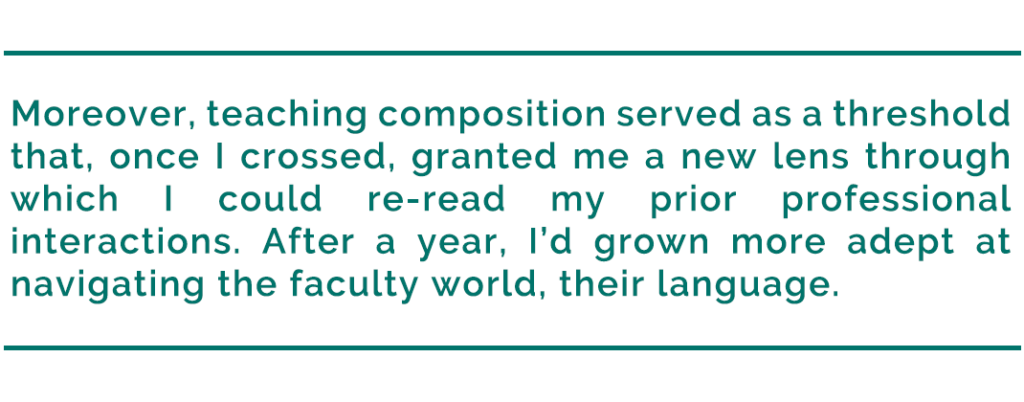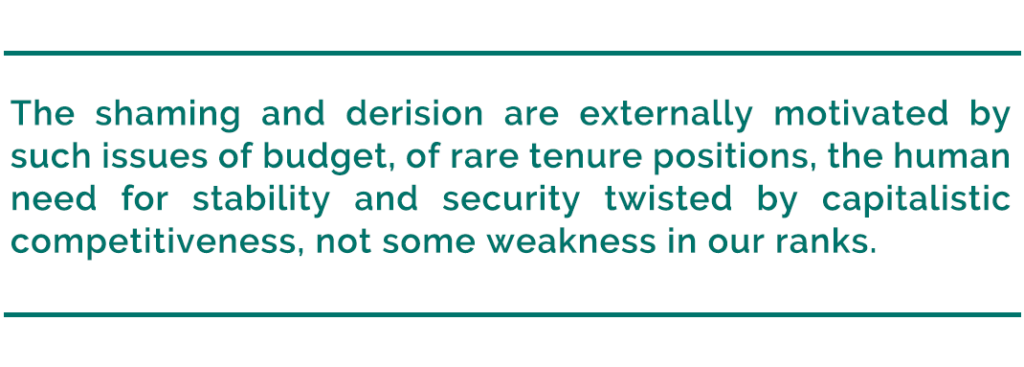By Tabitha Fisher, Pennsylvania State University
Unanswerable Questions
It’s September 2022, and I’m standing at the front of my classroom, walking through the questions my students posted online in response to the new assignment. At Penn State, nearly all instructors new to the department teach English 15, the university’s first-year writing course in rhetoric and composition. This is my first semester teaching after two years as the Writing Center Coordinator.
I pause, mid-overview, to ask if anyone has thought of additional questions. One of my students raises her hand.
“Is this going to be hard?” she asks. The question throws me for a loop; I blink a few times as I look back at her. Her eyes are narrowed in focus; her pen is poised to note down my answer.
I stare at her, blank. The class waits to see what I’ll say. “I have no idea how to answer that question,” I confess.
I receive this same composure-breaking question several times throughout the semester, always asked in complete earnestness and always knocking me off my rhythm. Most times, I break into laughter; I can’t help it. Of course it’s going to be hard, I want to tell them. Writing is hard. God, teaching it sure is hard. After I’m done laughing, I usually try to give them a general comment about what might be challenging and what might be familiar, while emphasizing that it will be hard work that is hopefully satisfying. Unsurprisingly, this response never appeases them.
A year later, I still don’t have a great answer to the question. Maybe it’s an imprecise question, like the common refrain in the Writing Center, “is this good?” Maybe it’s a polite way of framing another, tougher question, one I asked myself repeatedly throughout that year: “Will this be worth it?”
When I decided it was time to try teaching a composition course I wanted to better grasp the details of what my tutors were contending with, since our Writing Center primarily sees students from first-year writing courses. Not only would this knowledge better inform my choices in supervising our program, but also it would satisfy my need to feel like I knew what was going on and provide a sense of stability I’d craved from the beginning. I took my position as Writing Center Coordinator in February 2020 while in the final year of my master’s degree. The intention was that I would start part time in the spring, allowing me to finish school before fully stepping into my role in May. My first day in the office was during spring break. In the middle of the day, I was called into a conference room with my new colleagues and told we needed to move everything online, now. The University wouldn’t be bringing students back from spring break, concerned about the new “coronavirus.” At that point, I didn’t have time to dwell on whether I had enough rhetorical or pedagogical knowledge to lead a writing center, nor was I concerned about whether I had the gravitas to garner respect within the university. For a long time, coordinating the Writing Center was about survival.
By the time I sought a teaching position, my scope had widened; I’d been reading in the field and working with faculty and sensing something was off. I’d begun to feel that I was missing some essential foundation of what it meant to be a real Writing Center professional, a feeling that hadn’t faded with the first vaccines and a reintroduction to office life.

At the time, I didn’t know what felt so wrong. Was it my lack of faculty status, or my degree? Maybe it was my age or my gender or my first-gen status. But I couldn’t change those things; I couldn’t take on a Ph.D., and I couldn’t transmogrify myself into some hip Kerouac-esque Writing Center director that would instantly win over anyone I emailed via pithy signature line dripping with charisma. But I could teach and, perhaps in doing so, begin to ease the friction I’d begun to feel regarding myself and the gap I was meant to fill at the university.
Dubious Gains
That isn’t to say I wasn’t engaged in teaching before I stepped into the classroom. Facilitating a staff meeting or tutor training session is teaching. The countless emails, the advocacy work, and the morale-building are tasks executed with a keen rhetorical awareness. As Tatiana Glushko writes, “[writing center practice] is a distinct kind of teaching rooted in collaborative one-to-one pedagogy… Teaching in the writing center setting embodies what is often referred to as best practices in higher education…” (31–32). Writing center professionals are in the practice of teaching and composing all the time.
Classroom teaching, however, proved beneficial in new ways. My intellectual engagement in articulating rhetorical concepts and helping to develop student writing as an instructor pushed me to view composition from a new perspective. And I brought what I learned into the Writing Center, in the form of passing conversations, emails troubleshooting challenging tutorials, and novel designs developmental staff meetings. After a year of teaching, I was more familiar with the types of interactions that serve as a prefix for the ideas and attitudes that writers bring into the tutorial.

Moreover, teaching composition served as a threshold that, once I crossed, granted me a new lens through which I could re-read my prior professional interactions. After a year of teaching on top of my work as Writing Center Coordinator, I’d grown adept at navigating the faculty world and its language. But this has proven to be of dubious benefit.
When I proposed writing this blog post, I was in the middle of teaching my first semester, and I’d hoped to make some statement that would unseat the creeping sense that I didn’t belong. I’d hoped to prove that I was capable of standing toe-to-toe with other teachers of composition and simultaneously that I didn’t need to do so to be a good Writing Center professional. But I also wanted to learn—I “crave[d] intellectual labor for self-actualization and personal and professional status” (Geller and Denny 118). At the time, I didn’t know how to reconcile those states.
A year later, a new tension has emerged through an increased understanding of how the field at large sees people like me and the history that informs that perception. In crossing the threshold, the new vision I’ve acquired doesn’t paint me in the kindest light.
Tripping on the Threshold
Our field is full of folks like me: non-faculty writing center administrators who generally don’t carry teaching, publishing, or research obligations. On the low end, Perdue, Driscoll, Petrykowski found in their review of Writing Center Administrator(WCA) job postings that approximately 18% of their sample postings defined the role as a staff position. According to the 2020-2021 WCRP Report, the majority of director respondents (41.9%) and the majority of associate director respondents (17.9%) identified as non-faculty professional staff. Geller and Denny cite a 2009 IWCA analysis which reported 53% of Writing Center administrators held staff positions and 47% held faculty positions. These are the folks who fall beneath the ranks of even token professionals, those circling the perimeter of composition.

When I took my position, I didn’t know about the stigma associated with non-faculty status. It didn’t matter to me that I was going to be a staff member without teaching responsibilities; I was working, with writing no less! I had no way of knowing that composition has long been subject to a self-cannibalizing shame cycle, that contempt is a currency with which we purchase status (Lunsford 360), that there is a systemic compulsion towards hierarchy as a means of establishing security (Schneider A14). After a year of mingling among the ranks, I can see my younger self through a new lens: there she is, a stepping stone onto the bottom rung. Or, worse, a threat.
This isn’t meant to be dramatic; it’s a logical conclusion to the conversations surrounding the WCA’s status. Geller and Denny, in their exploration of the role allocation in writing centers, conclude that such variants in institutional status, the diversity of roles WCAs occupy, is “our greatest asset and our greatest threat” (124). After outlining the dubious freedom of the administrative professional from research and publishing responsibilities, Geller and Denny draw a grim conclusion: “when WCPs [writing center professionals] don’t publish, they perpetuate their own marginalization and invisibility by withdrawing, by intent or de facto, from any of the ‘larger’ disciplinary domains to which they might align” (118–119, emphasis mine). In this argument, the threat arises when the balance tips too far towards those of us not expected or incentivized to publish or teach, thereby coloring the field as illegitimate. In this view, shame results from an internal fault, something we ought to fix as a field if we don’t want to be mocked or derided by others.
I don’t believe there is an inherent weakness in writing center operations when they are run by non-faculty. I do believe teaching has informed my administration in new ways, and I believe we need WCAs to be practiced teachers to mentor tutors in navigating the loaded relationship of tutor-writer-instructor. As part of the field, I want representatives of that field to be engaged scholars. These skills are vital, but I don’t believe they must hinge on faculty status. Rather, I read a compulsion towards faculty status within writing centers as a type of defense mechanism from the sneers of colleagues and the predations of starving university budgets.

The shaming and derision are externally motivated not by some weakness in our ranks but by budget restrictions, of rare tenure positions, and the human need for stability and security. In the year before I taught, when I received an email from an angry faculty member accusing my center of “not even having an APA style guide” and wondering “who even trained these people,” they weren’t doing so because they could sniff out that I hadn’t taught composition or published an article. They likely responded out of a need for superiority, security. The lack of “PhD” in my signature line simply signaled that I was an acceptable target for their vitriol. I didn’t know any of this before I taught.
The Sting of Hindsight
In writing and reflecting for this post, I saw that my perspective shifted in response that year in the classroom, and I wanted to know why. I know now that the condescension towards non-faculty administrators like me is baked into academia, with hierarchies of shame replicated ad-nauseum. Moreover, the treatment I’d noticed was not in response to me as an individual but instead centered on my institutional status.
I know this because of how things have changed. Even though I am no longer teaching composition, now that I can put “part-time faculty” in my email signature line, I receive replies to my outreach. When I’m introduced by faculty, I get “compliments”: “Oh, Tabitha’s not just an admin; she actually knows what she’s doing.” But I’m still the same “me” that I was before the title. Having researched the impacts of this invisible hierarchy now for months, I know that this experience isn’t unique to me. It does still hurt.
So, what do I do if the shame is part of the system, if my experience was a little bit about teaching but more about my role at the university, if my being part of writing center studies makes us look bad? The solution might seem to be to keep pushing, keep teaching, and claw my way up in the eyes of my institution and the field at large, maybe shed the staff-status and become a “legitimate academic.”

And yet, in a system that must maintain a lower rung, I’m not sure how effective that strategy would be. If I’m honest, teaching last year left me frustrated and exhausted, particularly in my spring semester, when attendance was poor, and the weather was cold, and I felt like an actor keeping up the “good teacher” role with flagging enthusiasm. I learned so much in teaching, but by March I was desperate to be done with it.
My frustration only mounted when I looked back and began to see the outline of the portal I’d stepped through. I couldn’t be done with my experience when the semester ended because I had passed beyond a threshold, one which clearly illustrated to me that I would be more highly regarded if I kept at the thing which was so hard. I could see it right there, in the literature that I’d learned to read.
Taking on teaching responsibilities isn’t feasible for many WCAs or their institutions. For me, teaching composition every semester as a supplemental position isn’t sustainable. It took a lot out of me to teach on top of my regular responsibilities, and I’m distinctly aware of the various levels of privilege and local support I had to (barely) make it work. On a pragmatic level, to rewrite my role to require teaching composition is less profitable than occasionally teaching a section of my own volition. Indeed, such a rewrite would likely make me underqualified for my job: I don’t have a terminal degree. Aiming for a full-time faculty position would mean I’d have to leave the Writing Center, and I’d earn less. So much for the respect of the field.
Regaining Balance
So what do we do as a field? If I could wish for anything, it would be that we shirk this notion that institutional status has anything to do with our true self-worth and has everything to do with economic value placed on our professional identities. That’s a hard thing to shake, particularly when there’s so much incentive to buy into the idea, when the politics of higher education primes us to pull ourselves up by dragging down someone else’s bootstraps.
If the concern is that non-faculty don’t have ample experience in scholarly engagement and that this harms our field, we can find ways to make knowledge and opportunities accessible to the people working in those positions. Beyond the WCenter listserv, we can further index pedagogically and theoretically sound resources to which we can direct new WCAs, allowing those who are still learning (and finding time to learn) to implement sound practices without starting from nothing. Regarding tutor training, I’d like to see a cache of tutoring course syllabi and lesson plans for tutor development; I am particularly intrigued by the Rocky Mountain Writing Centers Association’s new publication, Center Moves, which aims “to serve as an archive of peer-reviewed lesson plans and materials, grounded in scholarship, theory, or praxis” for training tutors. I’m excited to see where those efforts go.

For administrators’ professional growth, we can continue to provide strong mentorship opportunities like the IWCA mentor match program, which has been pivotal for my development as an administrator for the past few years. We can expand indexes of publications that may be accessible to busy WCAs, such as IWCA’s list, and signal support for such writers in our calls. Those who formally teach/train as WCAs might post texts they found essential for their growth to further foundational knowledge for the field. While we can’t negate the local-level pains for non-faculty, we can work to make each other’s lives easier. To do so, we must centralize these resources and promote them, which means accepting and supporting the validity of non-faculty’s role in our field.

Now, at the end of 2023, I think back to my students’ confounding question in a different way. The question stunned me at the time because it felt so obvious that it was unanswerable. Now, I don’t think the question is as obvious as I initially believed. In asking, I think my students were more perceptive about anticipating the challenges of the course than I was. When I signed on to teach, I knew that the labor would be difficult, but I knew the task was within my ability level. I thought I would learn more about the skills involved in teaching during my time in the course. Instead of pedagogical strategies, teaching itself ended up showing me far more about my role in the field and how that had been influencing my experience from the beginning. To process my time in the classroom, I had to learn about the history of my field, the politics of my institution, my unique positionality and needs. What ended up being “hard” about the experience was so different from what I thought would be hard that I never could have anticipated the challenge itself. Looking back, I think that’s why I felt helpless in the face of this question from my students: I couldn’t diagnose for them, being their unique selves, what they would find hard. They had to go through the process themselves and find out on their own, just as I did.

My hope for my students was that they felt supported as they worked through the hard things. That is, likewise, what I want for my colleagues in the field now. The work is, and will continue to be, hard, but I believe it will be worth it.
Further Reading
“Evaluating the Intellectual Work of Writing Administration.” The Writing Program Administrator’s Resource: A Guide to Reflective Institutional Practice, Council of Writing Program Administrators, 2002, pp. 499–517.
Adler-Kassner, Linda, and Elizabeth Wardle, editors. Naming What We Know: Threshold Concepts of Writing Studies. University Press of Colorado, 2015.
Bouson, J. Brooks. “True Confessions: Uncovering the Hidden Culture of Shame in English Studies.” JAC, vol. 25, no. 4, 2005, pp. 625–50.
Carter, Shannon. “The Writing Center Paradox: Talk about Legitimacy and the Problem of Institutional Change.“ College Composition and Communication, vol. 61, no. 1, 2009, pp. W133–W152.
Faison, Wonderful, and Tatiana Glushko. “Beyond the Two-Tiered System: Contingency as a Tool for Academic Upward Mobility.” The Writing Center Journal, vol. 41, no. 1, 2023, pp. 28–34.
Ferruci, Stephen A. “Composition’s Professionalism vs. the Writing Center Director: Rethinking the Director as a Teacher.” The Writing Instructor, 2001. Accessed 8 Aug. 2023.
Geller, Anne Ellen, and Harry Denny. “Of Ladybugs, Low Status, and Loving the Job: Writing Center Professionals Navigating Their Careers.” The Writing Center Journal, vol. 33, no. 1, 2013, pp. 96–129.
Horner, Bruce. “Traditions and Professionalization: Reconceiving Work in Composition.” College Composition and Communication, vol. 51, no. 3, 2000, pp. 366–98.
Lunsford, Andrea. “Rethinking the Ph.D. in English.” Carnegie Essays on the Doctorate. Carnegie Foundation for the Advancement of Teaching: 2004, pp. 357–69.
Perdue, Sherry Wynn, and Dana Lynn Driscoll. “Context Matters: Centering Writing Center Administrators’ Institutional Status and Scholarly Identity.” The Writing Center Journal, vol. 36, no. 1, 2017, pp. 185–214.
Perdue, Sherry Wynn, et al. “Centering Institutional Status and Scholarly Identity: An Analysis of Writing Center Administration Position Advertisements, 2004-2014.” The Writing Center Journal, vol. 36, no. 2, 2017, pp. 265–93.
Schell, Eileen E. “Putting Our Affective House in Order: Toward Solidarity Rather than Shame in Departments of English.” JAC, vol. 26, no. 1/2, 2006, pp. 204–20.
Schneider, Alison. “Bad Blood in the English Department: The Rift between Composition and Literature.” The Chronicle of Higher Education, vol. 44, no. 23, 1998, pp. A14–A15.
Tabitha Fisher is the Writing Center Coordinator at the Pennsylvania State University, where she oversees the daily operations of The Writing Center @ Penn State Learning and the ongoing development of its staff. She is also a part-time lecturer in English, where she currently serves as a faculty tutor. Her current interests include curriculum development for ongoing tutor education, mentorship practices in writing centers, and best practices for ethical employment of undergraduate students.


